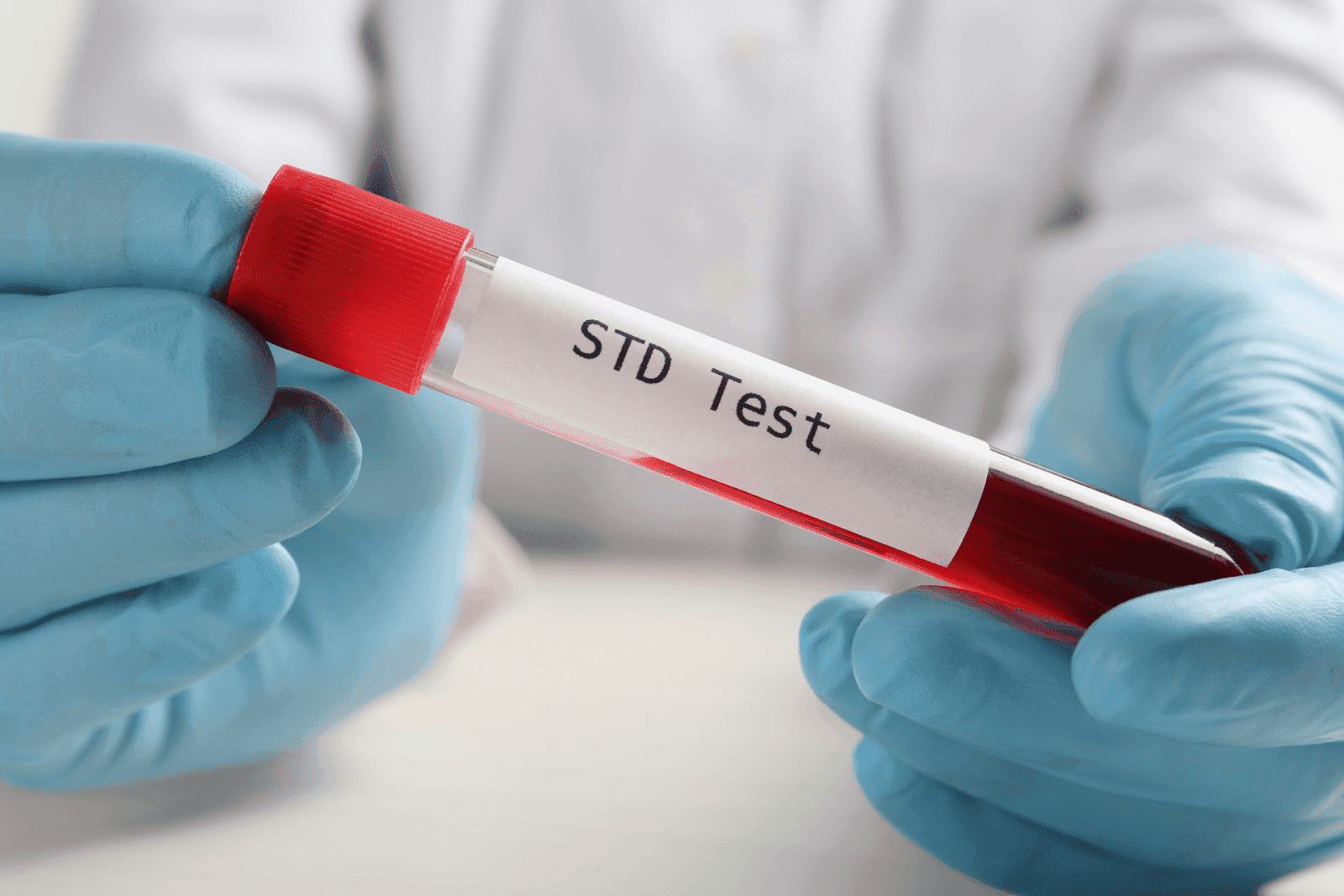How Long Can Chlamydia Stay in Your Body Without Symptoms?
Chlamydia is one of the most common sexually transmitted infections (STIs) worldwide. Despite its prevalence, many people remain unaware they have it because it often shows [...]
Read More
Medically reviewed by Alan Lucks | MD, Alan Lucks MDPC Private Practice - New York on October 15th, 2025.
70-95% of women and 50% of men with chlamydia experience no symptoms, allowing the bacterial infection to persist undetected for months or years while remaining highly contagious.
When symptoms do appear, they typically develop within 1-3 weeks of infection and may include abnormal discharge, burning during urination, or pelvic pain—but most people never experience warning signs.
Untreated infections cause serious complications including pelvic inflammatory disease in women (leading to infertility) and epididymitis in men, with reproductive damage occurring silently even without symptoms.
Healthcare providers recommend annual screening for sexually active individuals under 25 and those with multiple partners, since asymptomatic transmission between partners is extremely common.
Simple urine tests or genital swabs can detect the bacteria, and antibiotic treatment (typically azithromycin or doxycycline) cures the infection completely when taken as prescribed.
Chlamydia is one of the most common sexually transmitted infections (STIs) worldwide. Despite its prevalence, many people remain unaware they have it because it often shows no symptoms. This silent nature can lead to untreated infections, causing serious health complications. Understanding how long chlamydia can stay in your body without symptoms is essential for timely diagnosis and treatment. This article explores the asymptomatic period of chlamydia, its risks, and how modern telehealth services like Doctronic.ai can help you get tested and treated conveniently.
Chlamydia is caused by the bacterium Chlamydia trachomatis. It spreads primarily through sexual contact, including vaginal, anal, and oral sex. The infection can affect both men and women, targeting the genital tract, rectum, and throat.
One of the reasons chlamydia is so widespread is that it frequently causes no noticeable symptoms. According to the Centers for Disease Control and Prevention (CDC), approximately 70% to 95% of women and 50% of men with chlamydia experience no symptoms. This asymptomatic nature means many people carry the infection unknowingly, increasing the risk of transmission and long-term health issues.
 Why Does Chlamydia Often Go Undetected?
Why Does Chlamydia Often Go Undetected?The bacteria can reside quietly within the body’s mucous membranes without triggering an immune response strong enough to cause symptoms. This stealthy behavior allows chlamydia to persist for weeks, months, or even longer. Without symptoms, individuals rarely seek testing, which delays diagnosis and treatment.
In women, the infection may silently infect the cervix and upper reproductive tract, while in men, it can remain in the urethra or rectum without causing discomfort. This silent progression is why regular screening is crucial, especially for sexually active individuals under 25 or those with multiple partners.
Furthermore, the lack of symptoms can lead to serious complications if left untreated. In women, untreated chlamydia can result in pelvic inflammatory disease (PID), which can cause chronic pain and infertility. In men, it can lead to epididymitis, a painful condition that may also affect fertility. The long-term implications of chlamydia highlight the importance of awareness and proactive health measures, including open conversations about sexual health with partners and healthcare providers.
Additionally, the rise of telehealth services has made it easier for individuals to access testing and treatment without the stigma that may accompany in-person visits. Many clinics now offer at-home testing kits, allowing individuals to take charge of their sexual health in a private and convenient manner. This shift in healthcare accessibility is vital in combating the spread of chlamydia and ensuring that more people are informed about their sexual health status.
Chlamydia’s incubation period (the time between exposure and symptom onset) is typically 1 to 3 weeks. However, many infected individuals never develop symptoms at all. This means the infection can remain in the body unnoticed for months or even years.
Studies have shown that untreated chlamydia infections can persist for extended periods. In some cases, the bacteria may spontaneously clear from the body, but this is not guaranteed. Without treatment, the infection can cause damage over time, particularly in women. Chronic infections can lead to serious health issues such as pelvic inflammatory disease (PID), which can result in infertility or ectopic pregnancies, making awareness and proactive health measures essential.
Because symptoms are often absent, the infection’s timeline is difficult to pinpoint. After initial exposure, the bacteria multiply and colonize the mucous membranes silently. This asymptomatic phase can last:
Several weeks to months: Most people remain symptom-free during this period.
Up to years: In some cases, chlamydia can persist for years without symptoms, continuing to cause internal damage.
Given this uncertainty, regular testing is the only reliable way to detect chlamydia early. Early detection prevents complications and helps stop the spread to others. It is particularly crucial for sexually active individuals, especially those with multiple partners, to undergo routine screenings. The Centers for Disease Control and Prevention (CDC) recommends annual testing for sexually active women under 25 and older women with risk factors, highlighting the importance of awareness in sexual health.
Moreover, the lack of symptoms can lead to a false sense of security among those infected. Many may believe they are healthy and may not seek medical advice, inadvertently transmitting the infection to their partners. This silent nature of chlamydia underscores the need for education about sexually transmitted infections (STIs) and the importance of open communication with partners regarding sexual health. Understanding the risks and taking proactive steps can significantly reduce the incidence of chlamydia and other STIs in the community.
Even without symptoms, untreated chlamydia can lead to serious health problems. The longer the infection remains in the body, the higher the risk of complications.
In women, untreated chlamydia can ascend from the cervix to the upper reproductive tract, causing pelvic inflammatory disease (PID). PID can lead to chronic pelvic pain, ectopic pregnancy, and infertility. The CDC estimates that about 10% to 15% of untreated chlamydia infections in women progress to PID.
Men with untreated chlamydia can develop epididymitis, an inflammation of the tube that carries sperm, which may result in pain and, in rare cases, infertility. Additionally, chlamydia can cause reactive arthritis, a painful joint condition affecting both sexes.
Because chlamydia often has no symptoms, infected individuals may unknowingly transmit the infection to sexual partners. Pregnant women with untreated chlamydia risk passing the infection to their newborns during delivery, which can cause eye infections or pneumonia in infants.
Given the silent nature of chlamydia, routine screening is vital, especially for sexually active individuals under 25, those with new or multiple partners, or anyone with a partner diagnosed with an STI.
Testing for chlamydia is straightforward and typically involves a urine test or a swab from the cervix, urethra, or throat. Results are usually available within a few days.
Accessing testing and treatment has never been easier thanks to telehealth platforms like Doctronic.ai. Doctronic offers affordable and convenient telehealth video visits with licensed doctors available 24/7 across all 50 states. Whether you suspect you have chlamydia or want to get screened, Doctronic’s AI-powered system provides quick, knowledgeable, and personalized care from the comfort of your home.
Doctronic’s AI doctor synthesizes the latest peer-reviewed medical research to provide accurate health information instantly. If testing or treatment is needed, Doctronic’s human doctors can prescribe antibiotics and guide you through the process seamlessly. Over 10 million users have trusted Doctronic for their healthcare needs, appreciating the speed, accuracy, and personal touch that AI-powered primary care offers.
Many people feel uncomfortable or embarrassed visiting a clinic for STI testing. Telehealth removes these barriers, offering privacy and convenience. With Doctronic.ai, you can get expert advice, testing recommendations, and prescriptions without leaving your home. This approach encourages more people to seek timely care, reducing the spread of infections like chlamydia.
Prevention is the best way to avoid the risks associated with chlamydia. Safe sexual practices, including consistent condom use and limiting the number of sexual partners, significantly reduce the risk of infection.
Regular screening and open communication with partners about sexual health are also critical. If you or your partner tests positive for chlamydia, it is important to complete the full course of prescribed antibiotics and abstain from sexual activity until cleared by a healthcare provider.
Staying informed about STIs and utilizing modern healthcare tools like Doctronic.ai empowers individuals to take control of their sexual health. Early detection and treatment not only protect your health but also help prevent transmission to others.
 Understanding Chlamydia Risks and the Importance of Testing
Understanding Chlamydia Risks and the Importance of TestingChlamydia can remain in the body without symptoms for weeks, months, or even years, making regular testing essential. Untreated infections pose serious health risks, particularly for women, and can silently cause lasting damage. Fortunately, advances in telehealth, exemplified by Doctronic.ai, make it easier than ever to access expert care quickly and privately.
If you are sexually active, especially with new or multiple partners, consider regular chlamydia screening. Early diagnosis and treatment protect your health and the health of your partners. With AI-driven telehealth services, quality medical care is just a few clicks away.
Don't wait for symptoms to take charge of your sexual health. With Doctronic, you can get answers and peace of mind in seconds. Our AI Doctor is ready to provide you with the most modern, peer-reviewed medical advice, tailored just for you. Experience the most personal care available online, with unlimited access to an AI that remembers every detail of your health history. For a more in-depth consultation, our telehealth video visits connect you with real doctors anytime, anywhere. Skip the line. Talk to an AI Doctor Now, for free.
The infection can remain hidden in your body for years without symptoms while causing irreversible reproductive damage, making regular testing essential for sexually active individuals. Early detection through routine screening prevents serious complications and stops transmission to partners. If you're concerned about exposure or need guidance on testing, Doctronic can help you understand your risk and next steps.
Chlamydia is one of the most common sexually transmitted infections (STIs) worldwide. Despite its prevalence, many people remain unaware they have it because it often shows [...]
Read More